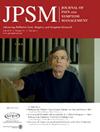动机性访谈:姑息治疗临床医生的框架
IF 3.2
2区 医学
Q2 CLINICAL NEUROLOGY
引用次数: 0
摘要
Outcomes1。定义和说明动机性访谈(MI)的关键原则,因为它们与严重疾病护理有关。在姑息医学案例中实践MI技能的应用。动机性访谈(MI)是研究得最好的唤起行为改变的方式之一,是姑息治疗临床医生的重要工具。本次会议为在HPM背景下MI的应用奠定了基础。使用姑息治疗,一个案例小品和互动形式,这个引人入胜的会议探讨了MI的关键原则在严重疾病护理中的应用。摘要动机访谈(MI)是一种基于证据的干预方法,旨在探索患者对改变的矛盾心理,并共同解决这种矛盾心理。在其40年的历史中,数百项研究已经证明了其在许多领域的有效性(1)。尽管这些影响广泛,但很少有工作关注如何最好地将该方法的关键原则应用于HPM实践(2)。MI方法的一个关键方面是将治疗过程作为变革的工具,使其成为具有沟通专业知识的HPM临床医生的理想框架,以帮助患者探索目标、价值观、本节课将通过姑息医学框架重点讨论动机性访谈的原则。它是由来自不同学科的作者创建的(他们都具有心肌梗死和姑息治疗的专业知识),他们共同向医学实习生、社会工作硕士项目和跨学科姑息医学部门教授心肌梗死。会议面向IDT的所有成员。DEI的原则将被探讨,因为身份的不同元素对患者如何处理他们的疾病经历有深远的影响。参与者将以互动和适用的方式参与内容,共同努力将基本概念应用于姑息医学案例。通过一个案例,我们将通过MI镜头重新定义变化的阶段。然后,我们将评估动机性访谈的四个过程,重点是沟通技巧。最后,参与者将有机会通过互动练习实时练习这些技能。结论:hpm临床医生始终关注行为改变,以提高患者及其家属的生活质量和目的驱动的行动。动机性访谈被认为是行为改变的前沿治疗工具,学习动机性访谈的实践理论和应用,可以提高我们在HPM实践中的临床疗效。[参考文献][1],刘建军,刘建军,刘建军。动机性访谈:一种系统回顾与元分析。[J] .中华医学杂志,2005;55(5):305-12。PMID: 15826439;PMCID: PMC1463134。2. Pollak KI, Gao X, Arnold RM, Arnett K, Felton S, Fairclough DL, Kutner JS。沟通辅导在缓和疗护临床医师动机访谈教学中的可行性。[J] .中华口腔医学杂志,2011;31(4):793 -793。doi: 10.1016 / j.jpainsymman.2019.11.010。Epub 2019 11月23日。PMID: 31765759。3. 米勒弯角。动机性访谈的演变。行为认知心理[j] .心理学报,2016,31(6):616-632。doi: 10.1017 / S1352465822000431。2023年5月12日PMID: 37170826。本文章由计算机程序翻译,如有差异,请以英文原文为准。
Motivational Interviewing: A Framework for Palliative Clinicians
Outcomes
1. Define and illustrate the key tenets of Motivational Interviewing (MI) as they pertain to serious illness care.
2. Practice hands on application of MI skills to a sample palliative medicine case.
Key Message
Motivational interviewing (MI), one of the best studied modalities to evoke behavior change, is a crucial tool for palliative care clinicians. This session lays the groundwork for application of MI in the context of HPM. Using palliative, a case vignette and an interactive format, this engaging session explores the application of key tenets of MI to serious illness care.
Abstract
Motivational interviewing (MI) is an evidence-based intervention exploring patients' ambivalence to change, working together to resolve that ambivalence. In its forty-year history, hundreds of studies have demonstrated its efficacy across many domains (1). Despite these wide-reaching implications, little work has focused on how best to apply the key tenets of this approach to HPM practice (2). A crucial aspect of an MI approach is the focus on the therapeutic process as a tool for change, making it an ideal framework for HPM clinicians with communication expertise to help patients explore goals, values, and behaviors (3). This session will focus on the tenets of motivational interviewing through a palliative medicine framework. It was created with authors from different disciplines (all with expertise in both MI and palliative care) who have collectively taught MI to medical trainees, Master of Social Work programs, and to interdisciplinary palliative medicine departments. The session is geared toward all members of the IDT. Principles of DEI will be explored, as different elements of identity have a profound impact on how patients process their illness experience. Participants will engage with the content in interactive and applicable ways, working together to apply the underlying concepts to a palliative medicine case example. Using a case, we will reconceptualize the stages of change through an MI lens. We will then evaluate the four processes of motivational interviewing with a focus on communication techniques. Finally, participants will have the opportunity to practice these skills in real time through interactive exercises.
Conclusion
HPM clinicians consistently focus on behavior changes to increase quality-of-life and purpose-driven actions with our patients and their families. Learning the practical theory and application of motivational interviewing, considered the forefront therapeutic tool for behavior change, enhances our potential for clinical efficacy in HPM practice.
References
1, Rubak S, Sandbaek A, Lauritzen T, Christensen B. Motivational interviewing: a systematic review and meta-analysis. Br J Gen Pract. 2005 Apr;55(513):305-12. PMID: 15826439; PMCID: PMC1463134. 2. Pollak KI, Gao X, Arnold RM, Arnett K, Felton S, Fairclough DL, Kutner JS. Feasibility of Using Communication Coaching to Teach Palliative Care Clinicians Motivational Interviewing. J Pain Symptom Manage. 2020 Apr;59(4):787-793. doi: 10.1016/j.jpainsymman.2019.11.010. Epub 2019 Nov 23. PMID: 31765759. 3. Miller WR. The evolution of motivational interviewing. Behav Cogn Psychother. 2023 Nov;51(6):616-632. doi: 10.1017/S1352465822000431. Epub 2023 May 12. PMID: 37170826.
求助全文
通过发布文献求助,成功后即可免费获取论文全文。
去求助
来源期刊
CiteScore
8.90
自引率
6.40%
发文量
821
审稿时长
26 days
期刊介绍:
The Journal of Pain and Symptom Management is an internationally respected, peer-reviewed journal and serves an interdisciplinary audience of professionals by providing a forum for the publication of the latest clinical research and best practices related to the relief of illness burden among patients afflicted with serious or life-threatening illness.

 求助内容:
求助内容: 应助结果提醒方式:
应助结果提醒方式:


